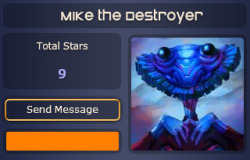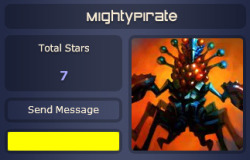
Mike – AKA Mike The Destroyer
 I started out with such optimism. Hindsight has taught me that this youthful enthusiasm was misplaced: my early forays into space were quickly crushed between Harry and Jamie’s uneasy alliance and, while they let me escape with a handful of ships, I never recovered.
I started out with such optimism. Hindsight has taught me that this youthful enthusiasm was misplaced: my early forays into space were quickly crushed between Harry and Jamie’s uneasy alliance and, while they let me escape with a handful of ships, I never recovered. The next fortnight was spent paying lip service to Joe and Kevin’s plans while trying to stave off the forces moving from the south. For a while, I harboured thoughts of recovery, especially after I stole away several of Joe’s planets under the guise of alliance, but my old foes caught up with me again, literally: I thought I’d done enough to flee Harry’s fleet, but his ships were faster than mine, and arrived at a far-flung world before me.
So, obviously, I fled north again, stealing planets away from Alex’s decimated empire. At this point, my lofty ambitions had been reduced to making sure that I wasn’t the first player to lose, and the swift exits of Joe, Clive and Alex ensured that I’d managed that, at least. Still, I didn’t expect Paul to be the one who took me down, gathering up my weakened planets in a sudden attack.
So, that was Neptune’s Pride. In some respects, it’s a horrible game, combining its slow-paced, addictive gameplay with constant feelings of paranoia and mistrust. For a few days I didn’t think about much else. And yet here I am, playing two new games, and planning a third with more colleagues.
I’m certain I wouldn’t be playing if I wasn’t playing against real people, and I’m equally sure that I’d recommend it to friends – although I do both with a guilty conscience, as I’ve seen what a little browser-based 4X game can do to people. Much like the end of my empire, it ain’t pretty.
Joe – AKA MightyPirate
 Since the game ended there’s been a lot of retrospective discussion – some of it summarised here, some of it you can listen to on the podcast.
Since the game ended there’s been a lot of retrospective discussion – some of it summarised here, some of it you can listen to on the podcast. Everyone, it seems, has a different opinion on how the game was won; some people claim weapon tech is the key to victory, others think scanning or range is the most vital. Some people think Harry won because Jamie was too nice to betray him; there's been much debate over what counts as a betrayal and so on. Over the course of the last month I’ve cycled through all the different theories and gone through a range of emotions – desperation, hope, bitterness, anger, resignation, you name it.
It’s also been suggested that a look at these attitudes and player behaviours can tell you a lot about a person; that Neptune's Pride functions is a drawn-out personality test. I think that’s true only on the most superficial and banal of levels. I didn’t need to find out that Harry bribed Mike with real money to attack me to find out how competitive and serious about winning Harry is, for example. It’s certainly not worth extrapolating too much from in-game behaviour either; Paul isn’t really a religious zealot, Kevin doesn’t have multiple personalities and Clive is lot friendlier than his in-game recalcitrance (to me anyway) would lead you to believe.
When you invest so much time and energy into something like Neptune’s Pride then it can be tempting to over-inflate your opinion of it to try and eke the most value out of the experience. “A sensible person wouldn’t obsess this much over something as silly as a game,” you reason to yourself. "I am a sensible person, so the only conclusion is that Neptune’s Pride must be more useful than it seems." You start to think it's going to give you a massive insight into the minds of your opponents.
That's a load of baloney; this is just a game. It’s an interesting one, definitely – an emotional rollercoaster in the right conditions, I’m sure. It’s fun and you should play it, but, as these protracted diaries prove, it’s easy to get caught up in things and starting taking it a bit too seriously.

MSI MPG Velox 100R Chassis Review
October 14 2021 | 15:04









Want to comment? Please log in.